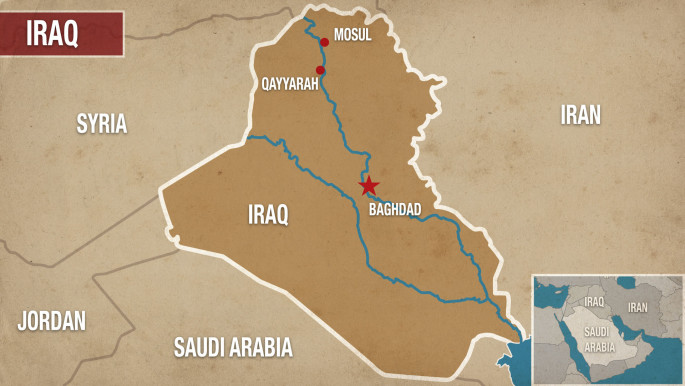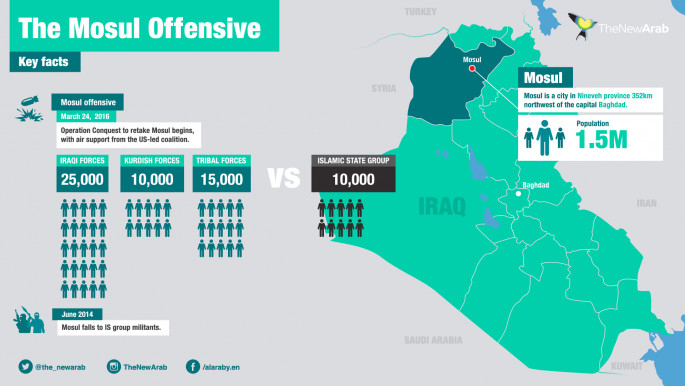Battle for Mosul: What you need to know
Since then the militants' grip has been gradually loosened, with Tikrit, Ramadi and Fallujah retaken by Iraqi special forces - significantly strengthened with training and aid from the United States.
The massive offensive to liberate Mosul will be make-or-break for both sides. Mosul is the most populous city under IS' control, and it was in the city's Great Mosque that IS leader Abu Bakr al-Baghdadi announced his self-proclaimed caliphate.
Having been kicked out of Dabiq in Syria on Sunday - a town of huge ideological value to the hardline Sunni group - losing Iraq's second city would be a further catalyst for its demise.
For Baghdad, winning back Mosul after the army's historic collapse two years ago would signify an important step towards the country's recovery after years of sectarian strife and bloodshed.
Who will take part in the battle?
In addition to the Iraqi army backed by a US-led coalition, Kurdish Peshmerga forces, Iraqi special forces and Sunni tribal fighters.
Shia militia forces are also expected to play a role in the Mosul operation, however their involvement has been particularly sensitive, as Nineveh province is a majority Sunni area and Shia militia forces have been accused of carrying out abuses against civilians in other operations against IS.
Turkey's insistence its troops take part in the battle, with 2,000 troops stationed outside of Mosul, has been rejected by Baghdad. It is unclear whether they will play a role in the operation.

What is the plan of action?
Iraq's special forces say the fight to retake Mosul will largely be launched from the north and east.
The Kurdish peshmerga forces say they will push IS out of a cluster of mostly Christian and Yazidi villages northeast of Mosul along the Nineveh plain, while Iraqi military troops try to cut the main supply line northwest of Mosul that links IS territory in Iraq to its strongholds in Syria.
A large number of Iraqi military forces are also expected to push up from Qayyarah air base,south of Mosul, which is expected to be the main hub of operations.
Once villages around Mosul have been cleared of IS fighters, Iraqi forces are expected to lead the push into the city of Mosul itself.
Is IS expected to put up a strong fight?
In recent battles on the road to Mosul, IS fighters largely fled and launched only limited, small-scale counterattacks.
As Iraqi forces have moved to isolate Mosul, residents reported that IS fighters have been reinforcing trenches around the city and setting booby-trapped explosives along main thoroughfares.
What about the civilians inside Mosul?
Hours before the operation began on Sunday, the Iraqi government dropped leaflets over Mosul, warning them of the impending battle, and offering advice on staying safe.
However preparations have long been in the making with aid agencies bracing for a mass exodus of civilians, which is likely to overwhelm humanitarian efforts.
The UN humanitarian coordinator for Iraq Lise Grande said only last week that it was significantly short of the $1 billion it needs to ensure the safety of those fleeing.
Of the up to 1.5 million people believed to be in Mosul now, around 200,000 are expected to try and escape.
So far, a total of six camps have been built that can accommodate 50,000 people, with 11 set to be constructed.
Civilians could also be trapped in the city, as Islamic State fighters have a history of forcing residents to stay in harm's way during previous battles to defend territory.
What can be expected from the battle?
While Iraqi forces have successfully pushed IS out of its territory over the past year, the Mosul fight is expected to be the biggest and most complex yet for the country's military.
Retaking Mosul also poses a huge humanitarian challenge, with an estimated 1.5 million people either fleeing the city as tanks roll in, or staying in their homes and risk being caught in the crossfire.
As well as the logistical hurdles, Mosul's liberation will test any attempts to stabilise Iraq. The country remains deeply divided, and the grievances between the Sunni, Shia and Kurdish communities that allowed IS to rise to power in the first place have not been resolved.
Some Iraqi officials have cautioned that even after Mosul is retaken from IS, violence will erupt again in the form of revenge killings or clashes between groups once allied against a common enemy.



